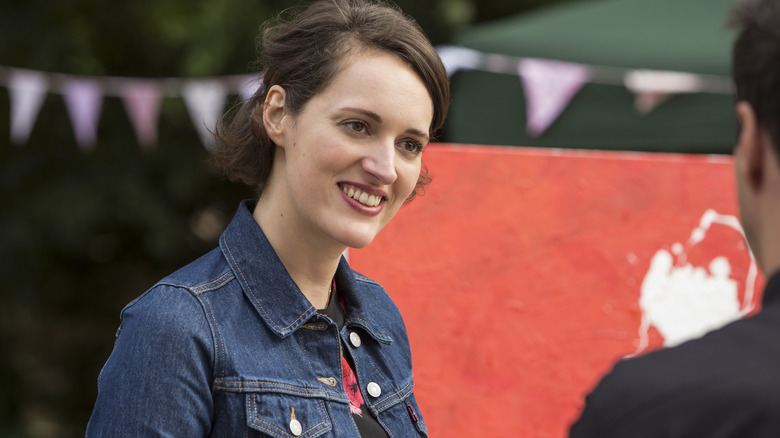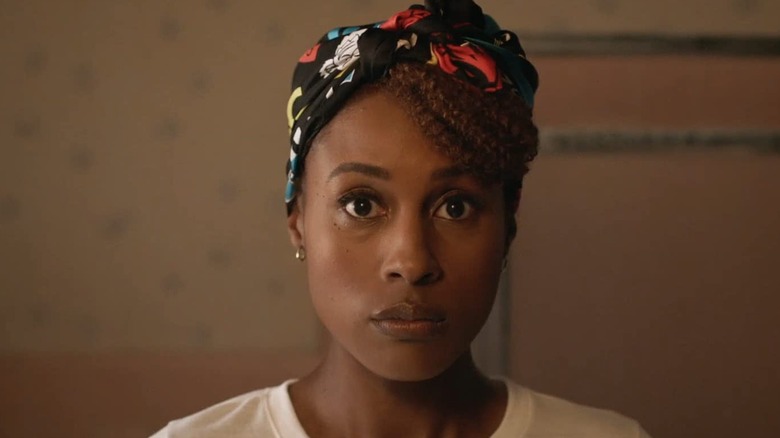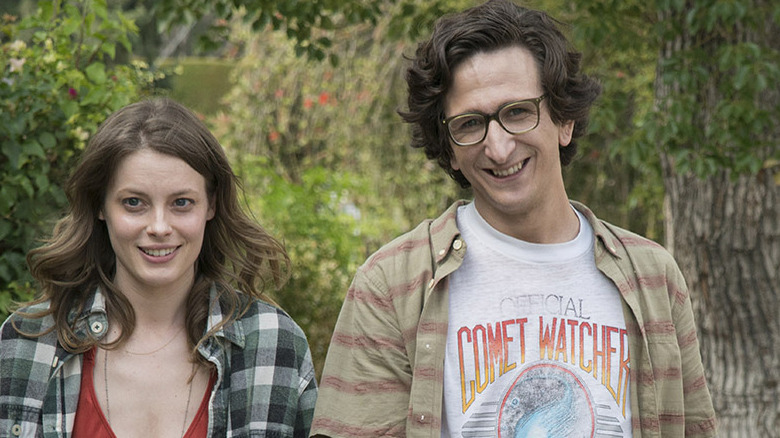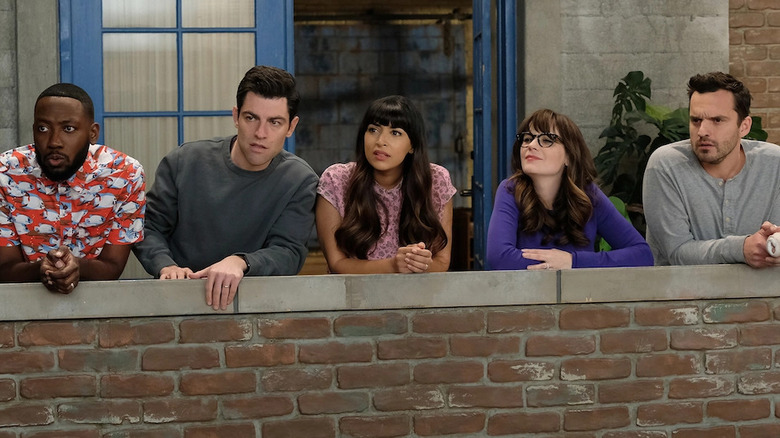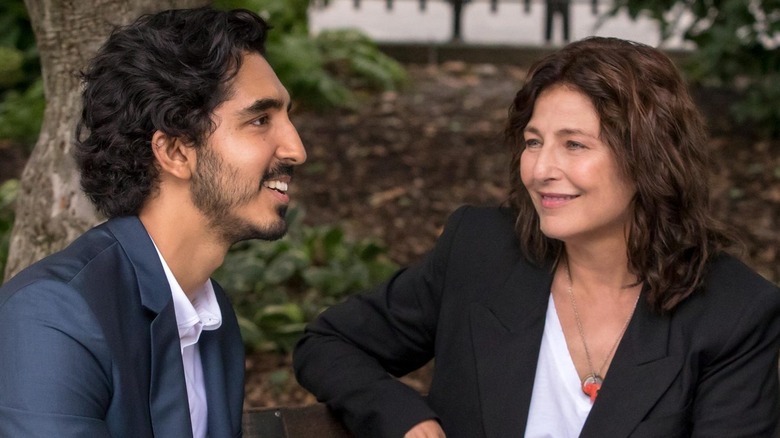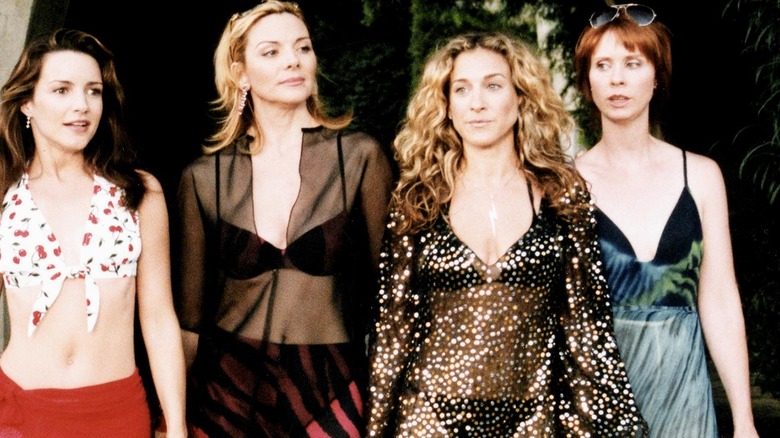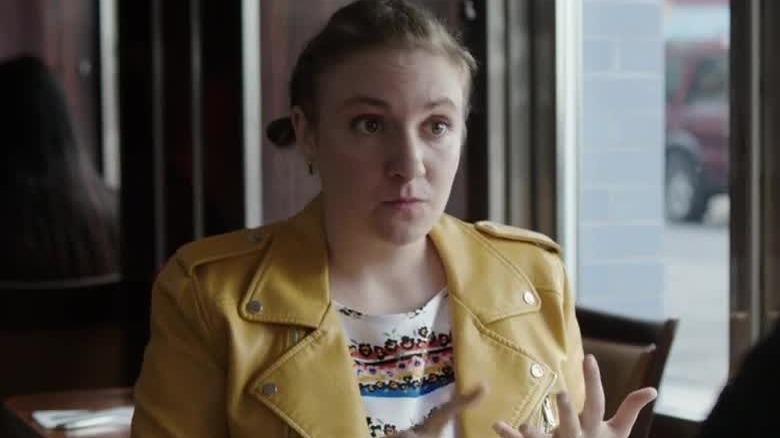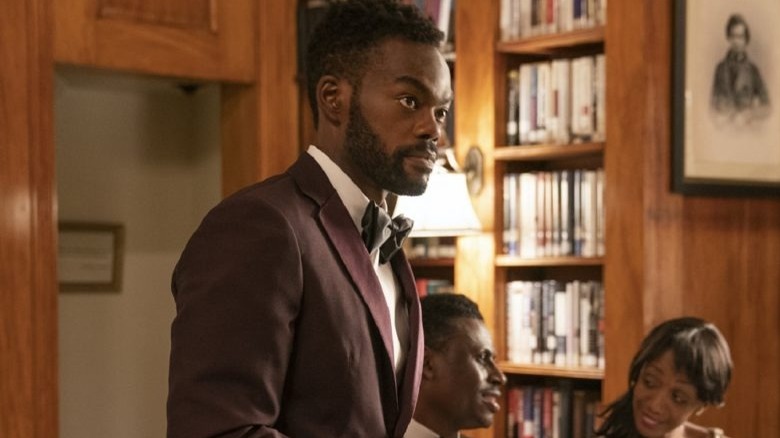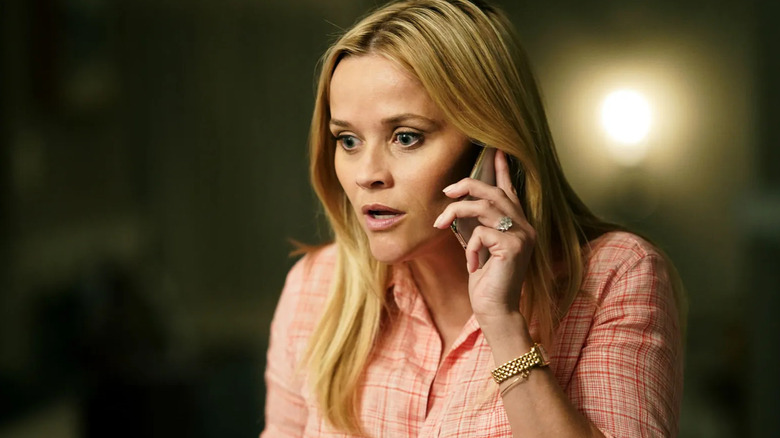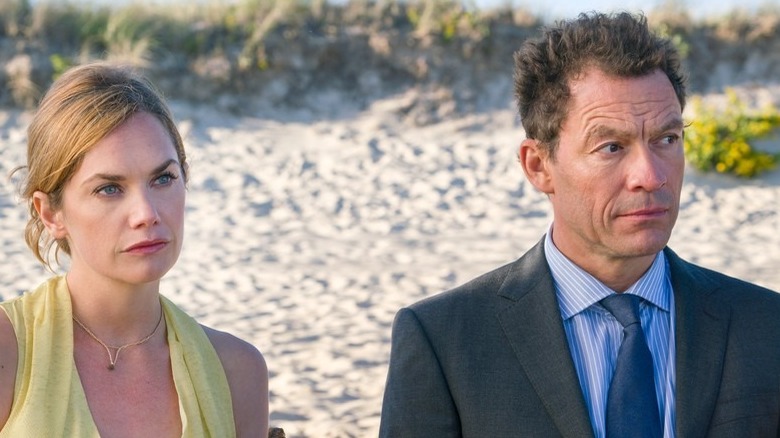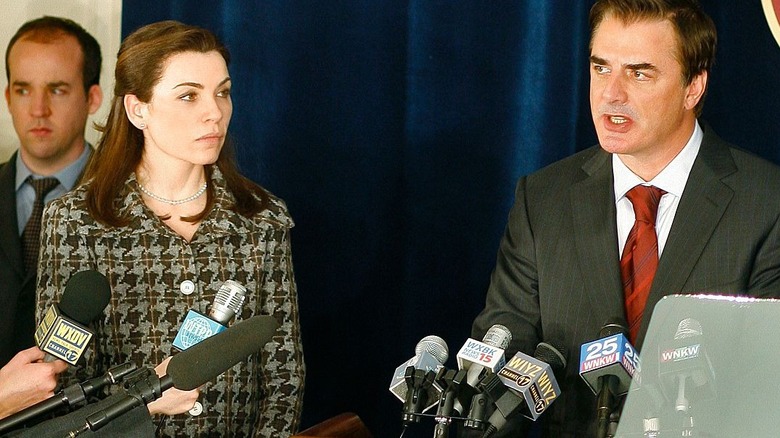12 Shows Like Mammals That Fans Should Check Out Next
"Mammals" is the latest in a long line of grounded series that investigate the nature of romantic relationships in contemporary society, with a particular focus on monogamy. James Corden leads the series, and despite the numerous unfavorable press reports regarding Corden — and there are many – this show has enough high points to be considered an upswing for his career.
The show has received mixed reviews from critics, although this does not necessarily reflect its quality. The show was described as "not original" by Entertainment Weekly but as "surprising" by the Times (UK); in truth, it exists between these two polarities. The cast is unquestionably the strongest part of the show — actors like Sally Hawkins, Colin Morgan, and Melia Kreiling milk the script for all it's worth and elevate an otherwise worn premise.
On the silver screen, however, there is no such thing as a retired notion because it's all about perspective. Even though "Mammals" appears to be a mini-series, hopefully the show's producers revisit the premise later in their careers. A few themes and premises from "Mammals" also pop up in some of the best TV series in recent memory. And whether viewers think the show is amazing and want to see more shows like it, or whether they're unimpressed and would prefer to see similar ideas presented in a way that does not include James Corden, we're here to help. Here are 12 shows similar to "Mammals."
Fleabag
The mysterious woman who is as alluring as she is misunderstood is one of screenwriters' most popular threadbare tropes. Amandine (Kreiling) fits that archetype in "Mammals." Amandine is Jamie's (Corden) wife, and the first episode establishes that she is cheating on him. Unfortunately, it takes the show's entire duration to figure out why she chooses to be unfaithful. While the payoff is worth the wait, she didn't have much else to do until then, making for one of the show's weakest points.
One method to avoid this pitfall is to make the characters more complex, which "Fleabag" does exceptionally well. Phoebe Waller-Bridge created a series that goes beyond simply demonstrating how difficult it is to build a connection in a generation where everyone has a plethora of options for partners. The show's decision to focus on Fleabag's emotional trauma rather than the havoc she causes in the lives of her family and friends tends to make viewers compassionate towards her.
The two shows share many similarities, one of which is their tight structure. "Fleabag" only has a few episodes, as is typical of most British shows, but they are all excellent and definitely worth watching.
Insecure
The most prominent theme in "Mammals" is the various forms of infidelity. Some kind of adultery damages every meaningful relationship in the show. And while the person found cheating is frequently and appropriately vilified from the outside, the reality of their situation is often more nuanced. Ultimately, the ending of "Mammals" validates Amandine's decision to be unfaithful. The show's true genius is that the entire plot is just an artifice to transform the victim into a villain to demonstrate the hypocrisy that plagues many relationships. Some fans are drawn to that theme, and no series in recent memory takes it as far as "Insecure."
"Insecure" follows Issa Dee (Issa Rae) as she struggles to not just establish herself as an entry-level employee at a California non-profit, but also to hash out her on-again, off-again romance with Lawrence (Jay Ellis). The show begins with Issa — who is the generally sympathetic protagonist, remember — cheating on Lawrence. Throughout five seasons, the two discover ways to forgive each other and evolve past their misgivings, acknowledging Lawrence's role in Issa's infidelity.
The long-running structure of the show allows it to investigate not only how the two characters' flaws affect each other, but also how these issues trickle into their other relationships. The emphasis on humanizing each central character is a major reason why the show meant so much to fans who watched it during its original run. Fans of "Mammals" might appreciate it.
Love
Jamie and Amandine's meet-cute is one element of "Mammals." In their first encounter, Amandine is on her fiancé's boat where Jamie works as a below-deck cook. Amandine appears to be way out of Jamie's league, but the two fall in love and leave their respective relationships for each other after seeing way too many signs that they simply cannot ignore.
Netflix's "Love" is another show that depicts a man falling in love with a woman who does not appear to be someone who would date someone like him. "Love" stars Paul Rust and Gillian Jacobs from "Community." The show follows their characters — Gus and Mickey, respectively — as they strive to make it in the entertainment industry. Despite their apparent differences, it soon becomes clear that Mickey's inauthenticity mirrors Gus' awkward nervousness.
"Love" is produced by famed comedy filmmaker Judd Apatow, so his offbeat and overlong approach to comedy is palpable throughout the show. The episodes run for over 40 minutes, which is unusual for a comedy, and "Love" is not afraid to get risqué. However, the show stays afloat, and its substance always triumphs over style. It is one of the most underappreciated shows of its time.
New Girl
"Mammals" lightly touches on the frailty of adult friendship. For instance, when Jamie discovers that Amandine cheated on him, he appears to be more concerned with who she cheated with than why she cheated. He continues to learn the identities of the people Amandine cheated with quite early on and even confronts one of them. But there's one lover she had named Paul, who Jamie can't quite find. Jamie eventually discovers it was a fictitious name used by his best friend and brother-in-law, Jeff (Colin Morgan).
Naturally, not all fans are interested in the negative aspects of adult friendship, and almost everyone is already aware of "Friends" and "How I Met Your Mother." For such fans, "New Girl" is a terrific series to watch; it's humorous and engaging, and each character gets their moment to shine. Furthermore, while Nick and Jess may not be considered one of the most iconic TV couples of all time, they may be one of the cutest couples to ever grace television.
When discussing the top sitcoms of the 2010s, "New Girl" is frequently overlooked. And admittedly, there are seasons when the replacement of key characters disrupts the chemistry of the cast. Nonetheless, the show maintains high quality throughout, and the theme music is enchanting.
Normal People
In essence, "Mammals" wants fans to understand that relationships can be messy and challenging. Something different affects almost every relationship in the show. Amidst the show's multiple infidelities, Lue (Sally Hawkins) appears to have a unique relationship problem. She has withdrawn from her relationship and is fantasizing about herself as a character in Coco Chanel's biography, written at a time when women were only beginning to experience self-actualization in society.
Hulu's "Normal People" is another show that focuses on the problems in relationships. The leads of "Normal People," played by pre-fame Paul Mescal and Daisy Edgar-Jones, are much younger than the "Mammals" crew, though the setting is also in Europe. The show follows Connell (Mescal) and Marianne (Edgar-Jones) as they both struggle to express their feelings for each other while the show also focuses on Marianne's unstable family life. Unfortunately, Connell adds insult to injury by never sticking up for Marianne, as she is routinely bullied at school.
The show is based on a novel with the same title and was well-received by critics and fans.
Modern Love
"Mammals" is an Amazon Prime show, and the streaming service seems to be developing a track record for giving show producers significant creative license, resulting in odd shows like "The Boys" that stand out from their contemporaries.
"Modern Love" is another Amazon show that trades in untested, unexpected, occasionally risky concepts. The anthology series is based on a weekly New York Times column that's penned by different writers each week about the various sorts of romantic entanglements they experience in contemporary society. Because of the one-off nature of the show and its excellent writing, it has no trouble enticing some of Hollywood's biggest stars — Anne Hathaway, Dev Patel, and Catherine Keener, for a few examples — to appear on it.
The show is widely regarded as one of the better anthology shows available today, especially in light of the absence of other anthologies like "The Twilight Zone" and the lengthy hiatus of "Black Mirror." While "Modern Love" is nothing like the other two in many significant respects, some viewers quickly realize this is entirely the point — "Modern Love" isn't scary at all. In these challenging times, some viewers choose shows that focus on the more positive, non-disturbing sides of humanity.
Sex and the City
The central theme of "Mammals" is undoubtedly the assertion that people frequently have an insatiable sexual appetite. Sex, of course, is a fascinating subject. But examinations of sex on TV have not always been the norm. In the past, it's been a source of contention among rating boards. Some viewers don't want to sit at home with their loved ones and watch anything to do with sex. Meanwhile, other viewers would prefer if every episode of every TV show was about sex.
"Sex and the City" — a program that every TV fan has probably heard of — finally offered the latter group something they could sink their raunchy teeth into in the late 1990s. In this era, it's almost impossible to comprehend just how revolutionary "Sex and the City" was at the time. It's about four single women living in New York City and how they deal with love and sex. The show never shies away from making its main characters unlikeable, and some of the episodes are still salient today despite being produced more than two decades ago.
When it comes to approaching taboo topics in the context of romantic comedy on television, shows like "Mammals" clearly owe some debt to "Sex and the City."
Girls
"Mammals" shines brightest when it depicts its characters' flaws. Amandine is shown to be vengeful and manipulative when she feels slighted in the milestone episode where Jamie and Amandine decide to date. According to the series, Amandine only gets manipulative and vindictive when she feels provoked and justified. The show's climax eventually pays off all this character building.
Lena Dunham's "Girls" gets compared to "Sex and The City" all the time, and while both shows are comedies focused on four women in New York City, that's actually the extent of their similarities. The women of "Girls" are younger and more dysfunctional, the show's approach to humor is drenched in a millennial irony that Carrie Bradshaw wouldn't appreciate, and the male characters — especially Adam Sackler, played by Adam Driver in his breakout performance — are arguably more fully realized than the various beaus of "SITC." The "Girls" can be pretty terrible, but contrary to popular thought, audiences don't always have an issue appreciating a character who makes bad choices as long as they're written with nuance. The "Girls," like Amandine, have boatloads of nuance.
"Girls" is notable for wearing its particularly 2000s style of hipster feminism on its sleeve, which adds a unique element that might be hard to find elsewhere. "Girls" was so well received that there has been talk of a "Girls" revival, but in the meantime, fans can watch the original on HBO.
Love Life
"Mammals" focuses not only on relationships, but also on parenthood. Amandine leaves her old fiancé, Jack, after discovering he is cheating on her. But she does this while she is already pregnant with his child. Nonetheless, she does not let the pregnancy affect her decision. She is unhappy with Jack and leaves for someone who makes her happy. This is commendable and should be explored further on television.
"Love Life" on HBO Max is one of the most innovative series in recent times. It takes the best elements of shows like "Modern Love" and focuses them all on one character. The first season focuses on Anna Kendrick's Darby, who contends with single parenthood, friendship, job challenges, and romantic relationships. The best twist occurs when the audience begins to fear that the story is in danger of becoming tedious and drawn out. The second season has an entirely different main character played by William Jackson Harper, and the audience follows him through his various life lessons, just as they did with Anna Kendrick's character in Season 1.
The show mainly relies on the charm of the leads from both seasons, which, fortunately, is sufficient to push the audience through a whole season. As a result, "Love Life" is a cozy comfort show.
Big Little Lies
On-screen vengeance can be therapeutic at times. "Mammals" accomplishes this with a twist at the climax when fans discover why Amandine cheated. It's painstakingly constructed using bricks that only make sense at the end.
"Big Little Lies" is another drama that explores vengeance. The show follows middle-aged women in a wealthy community and includes some of Hollywood's top stars, with some such as acclaimed actor Meryl Streep making a rare television appearance. The first season focuses on how the women deal with their unhappy marriages. The violent tendencies of Alexander Skarsgård's Perry Wright are at the heart of the story. As the layers begin to peel away, the audience sees how damaging this man has been throughout the lives of the other character. In the interest of avoiding spoilers, let's say they may or may not get their revenge.
The first season is based on a book, and it was so highly received that it inspired a second season that went beyond the original source material. The second season's focus is on how other women defend these abusive men, thereby examining themes of internalized misogyny, which feels pretty uncommon on-screen. Unfortunately, tragic circumstances appear to have precluded production for a third season. Nevertheless, the first two seasons are very worth watching.
The Affair
"Mammals" is preoccupied with marital infidelity. There's even a scenario where Jeff delivers a lecture at a university, attempting to rationalize how it's just human nature for people to engage in affairs. At the same time, it is later shown that he is an untrustworthy narrator because he may have a little more skin in the game than simply promoting his book on the same subject. Some audience members may be left intrigued, particularly by why someone would betray the person they love in such a cruel manner.
No television show covers this theme more than "The Affair." The show follows Noah (Dominic West) as he travels to a small town with his family for a vacation where he meets a waitress named Alison (Ruth Wilson), and they gradually begin an affair. While the setup may appear cliched at first, what elevates it is the clever use of the Rashomon effect to show us how each character interprets the situation without ever committing to which version is true. In Noah's recollections, Alison is a seductress, and Noah is slightly sleazy in Alison's.
The run of the show was received with accolades and honors. And it gives the audience a look at how someone truly perceives themselves while they engage in an affair and why someone would do it. Very few TV dramas deal with infidelity as well as "The Affair."
The Good Wife
In "Mammals," Amandine can simply walk out of a relationship when she feels slighted. She's even able to do it twice. In reality, there are usually caveats to such a decision. In many cases, especially when the victim is a woman, family, reputation, and expectations are frequently on the line. As a result, women cannot always leave a marriage easily after their partner cheats. For viewers who may wish to watch a show that addresses that aspect of the issue, there's "The Good Wife."
"The Good Wife" examines toxic gender dynamics in infidelity and marks Julianna Margulies' long-awaited return to television. The show clearly plays on the idea of Marguiles' comeback when, after her politician husband is caught in an infidelity scandal, she decides not to divorce him, but to stop being a housewife and return to practicing law. While the show's central focus is undeniably the practice of law, considerable time is spent on Margulies' character's reinvention as a woman doubting her marriage and deciding whether she wants to stay or leave.
"The Good Wife" is full of thrills, humor, and romance. And it's got way more episodes than "Mammals," which can be a plus.

